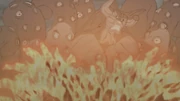LeafShinobi (talk | contribs) mNo edit summary |
Sarutobii2 (talk | contribs) No edit summary |
||
| (17 intermediate revisions by 11 users not shown) | |||
| Line 1: | Line 1: | ||
{{Infobox/Jutsu |
{{Infobox/Jutsu |
||
| + | |ref=<ref name="d4">Fourth Databook, page 315</ref> |
||
|image=Kakazan.png |
|image=Kakazan.png |
||
|kanji=花果山 |
|kanji=花果山 |
||
| Line 7: | Line 8: | ||
|viz manga=Floral Mountain |
|viz manga=Floral Mountain |
||
|game names=Huaguo Mountain |
|game names=Huaguo Mountain |
||
| − | |jutsu classification= |
+ | |jutsu classification=Kekkei Genkai~Lava Release, Ninjutsu, Taijutsu |
|jutsu type=Lava Release |
|jutsu type=Lava Release |
||
|jutsu class type=Offensive |
|jutsu class type=Offensive |
||
|jutsu range=Short, Mid, Long |
|jutsu range=Short, Mid, Long |
||
| − | |users=Rōshi, Son Gokū |
+ | |users=Rōshi, Son Gokū<!-- Do not remove Son Gokū, the Fourth Databook implied that it is a user --> |
|debut manga=566 |
|debut manga=566 |
||
|debut anime=121 |
|debut anime=121 |
||
| Line 18: | Line 19: | ||
|jutsu media=Anime, Manga, Game |
|jutsu media=Anime, Manga, Game |
||
}} |
}} |
||
| − | While in his [[Version 2|transformed]] state, |
+ | While [[Rōshi]] is in his [[Version 2|transformed]] state, he can create a small volcano that explodes violently, sending molten rock flying up in all directions like a giant flower. The heat of the lava is enough to burn [[tailed beasts]] as strong as [[Gyūki]]. |
== Trivia == |
== Trivia == |
||
* The summit of the {{translation|[[Wikipedia:Mount Huaguo|Mountain of Flowers and Fruits]]|花果山|Ja: Kakazan, Ch: Huāguǒshān}} is the birthplace of Sūn Wùkōng, the main character of the Chinese novel ''[[Wikipedia:Journey to the West|Journey to the West]]''. The mountain is located on a volcanic island. The Four-Tails, of course, is based on Sūn Wùkōng and the ''Dragon Ball'' series, which in turn is also based on ''Journey to the West''. |
* The summit of the {{translation|[[Wikipedia:Mount Huaguo|Mountain of Flowers and Fruits]]|花果山|Ja: Kakazan, Ch: Huāguǒshān}} is the birthplace of Sūn Wùkōng, the main character of the Chinese novel ''[[Wikipedia:Journey to the West|Journey to the West]]''. The mountain is located on a volcanic island. The Four-Tails, of course, is based on Sūn Wùkōng and the ''Dragon Ball'' series, which in turn is also based on ''Journey to the West''. |
||
| − | * When written as 火山, kazan means 'volcano' |
+ | * When written as 火山, kazan means 'volcano'. |
| − | * In an anime exclusive sequence, Rōshi, while offscreen, used what appears to be this technique just before being defeated by Kisame, the lava and Kisame's Water Release seen clashing. |
+ | * In an anime exclusive sequence, Rōshi, while offscreen, used what appears to be this technique just before being defeated by [[Kisame]], the lava and Kisame's [[Water Release]] seen clashing. |
| + | |||
| + | == References == |
||
| + | <references/> |
||
[[es:Montaña de Frutas y Flores]] |
[[es:Montaña de Frutas y Flores]] |
||
| + | [[ka:ყვავილი-ხილის მთა]] |
||
Revision as of 20:16, 13 April 2015
While Rōshi is in his transformed state, he can create a small volcano that explodes violently, sending molten rock flying up in all directions like a giant flower. The heat of the lava is enough to burn tailed beasts as strong as Gyūki.
Trivia
- The summit of the Mountain of Flowers and Fruits (花果山, Ja: Kakazan, Ch: Huāguǒshān) is the birthplace of Sūn Wùkōng, the main character of the Chinese novel Journey to the West. The mountain is located on a volcanic island. The Four-Tails, of course, is based on Sūn Wùkōng and the Dragon Ball series, which in turn is also based on Journey to the West.
- When written as 火山, kazan means 'volcano'.
- In an anime exclusive sequence, Rōshi, while offscreen, used what appears to be this technique just before being defeated by Kisame, the lava and Kisame's Water Release seen clashing.
References
- ↑ Fourth Databook, page 315

